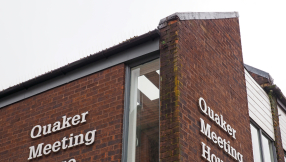Over 1,700 leading pastors, business and Christian institutional leaders from 39 countries gathered in Lake Forest, California, to create The PEACE Coalition, a new international alliance of churches, businesses, ministries, universities, and other institutions.
The launch of the PEACE Coalition occurred at a three day Purpose Driven Network Summit last week hosted by Saddleback Church, where Rick Warren is the founding pastor. The coalition will cooperate in a global mission strategy called the P.E.A.C.E. Plan, which is a massive, long range effort to mobilise one billion Christians in local churches around the world to copy Jesus' model of ministry.
"For followers of Jesus, one of the most important words in our vocabulary is the word 'Go!'" Warren said. "Jesus repeatedly commanded every believer to go; you can't spell gospel or good news without 'go' - ours is an active, not passive, faith."
P.E.A.C.E. is an acronym for Promote reconciliation; Equip servant leaders; Assist the poor; Care for the sick; and Educate the next generation. Coalition members see these actions as Jesus' antidote to five "global giants" - problems that affect billions of people worldwide: spiritual emptiness, self-centered leadership, poverty, pandemic disease and illiteracy.
For the past four years, thousands of members of Saddleback Church have been testing prototypes of the P.E.A.C.E. Plan around the world. During this phase, called P.E.A.C.E 1.0, more than 7,700 members volunteered on over a thousand P.E.A.C.E. teams to serve in 68 countries.
A dozen other Purpose Driven Network churches were invited to beta-test the plan with Saddleback. After studying the data reported back by these teams, Warren felt confident that the second phase, PEACE 2.0, was ready to be released with the public launch of the PEACE Coalition.
At a post-summit press conference, Warren pointed out that the size and complexity of the P.E.A.C.E. Coalition's objective would likely take decades to accomplish. "We usually set goals too low and try to reach them too quickly," he said. "Instead we should set God honouring goals in faith, and then invest the rest of our lives working toward them. This plan could take 50 years so it might not be completed in my lifetime. That's why I call the next generation the Reformation Generation."
During the summit, Warren outlined how the P.E.A.C.E. Plan is both a framework and a network for global mission. Confiding that a leader of a large, well- known parachurch ministry had told him the P.E.A.C.E. Plan was too ambitious for "mere amateurs", Warren reminded summit attendees that it was simply the same strategy that Jesus modelled with his disciples.
"The P.E.A.C.E. Plan just follows the instructions Jesus gave to his 70 'amateurs' in Matthew 10 and Luke 10 when he sent teams into villages," Warren said. "It is Jesus' framework for ministry, not ours."
Warren said of the P.E.A.C.E plan, "Ordinary people, empowered by God's Spirit, doing what Jesus did, together, wherever they are."
It is based on Jesus' final instructions to the church in Acts 1:8, "You will receive power when the Holy Spirit comes on you; and you will be my witnesses in Jerusalem, and in all Judea and Samaria, and to the ends of the earth."
Warren noted that Jesus' command to go take the Good News further and further is simultaneous, not sequential. "We are to go to Jerusalem and Judea and Samaria and the ends of the earth - all at the same time," he said.
"Jesus instructed his followers to do something that was physically impossible at that time because ocean crossing transportation didn't exist. People didn't even know about the Americas or Australia. Truly global mission was completely out of their realm of ability. But in His timing God has provided the technology for his commission to be fulfilled. You can now go practically anywhere in the world in about 24 hours."
Speaking of the P.E.A.C.E. Plan as a network, Warren pointed out that every time a new communication technology has arisen, the world has witnessed an expansion of the Gospel and growth of the church. He gave as examples, the Gutenberg press, the telephone, the radio, the television and now the Internet.
"Today, anyone anywhere can reach everyone everywhere," stated Mark Beeson, pastor of Granger Community Church in South Bend, Indiana, referencing the global reach a single believer can have with a computer connected to the Internet.
"Using technology that was previously unavailable for collaboration in global mission is one of the factors that are allowing us to create this new P.E.A.C.E. Coalition," added Nelson Searcy, pastor of The Journey Church in Manhattan, New York. Both Beeson and Searcy serve on the PEACE Coalition Council.
Another coalition member, Dave Ferguson, pastor of Community Christian Church in West Chicago, Illinois, said, "Local churches can now work directly with each other through a decentralized network instead of being separated by hierarchical silos."
Churches took the opportunity during the summit to set up church-to-church partnerships for P.E.A.C.E. projects around the world.
P.E.A.C.E. Coalition members will be able to access free software to coordinate their projects. Saddleback Church invested $3 million in the initial development of six modules: A member mobilisation module, a project management module, an e-learning training module, a world missions database module (awarded best Christian software in 2007), a PEACE Coalition social network, and a private social network for pastors Additional funding is being sought to complete the 4.0 version.
Warren noted that for 1,900 years, local churches initiated missions around the world, but in recent history, Western churches have largely abdicated their responsibility to parachurch organisations. New ministries to the poor, the sick, the uneducated, the lost and other groups were born when local churches failed to address those needs.
"First and foremost, the P.E.A.C.E. Plan is about reclaiming the primacy of the local church's role in global missions; to me, that is worthy of a reformation," Warren said, "Those other wonderful ministries do incredible work, but their capacity is miniscule compared to the potential of a worldwide network of local churches. Besides, in the New Testament model, Paul, Barnabus and others were sent out by a local church."
Warren explained how his members used to hand-deliver care packages to kids in Third World villages through a parachurch organisation. Saddleback members felt good about it, but the plan ignored and devalued the long-term ministry of the local indigenous churches. Now every project is done through local churches, ensuring that those churches are strengthened, receive the credit and are seen as the heroes in their communities.
"At a wedding the bride is the main character, the centre, the star of the show - everyone else is supporting cast, but the glory goes to the bride," Warren concluded. "The P.E.A.C.E. Plan is built on the same principle. The Bride of Christ - of which the church is its local expression around the world - deserves the focus, the credit and the glory for faithfully serving their communities year after year."
Most Popular
Stay up to date with Christian TodayNews

Nigeria: 11 killed in night attack by militants
11 people were killed in yet another massacre in Nigeria

Quakers respond to police raid with worship meeting outside Scotland Yard
Quaker activists will protest against a raid on their Meeting House by the police

Can ordinary Christians learn from the Amish?
From questioning the use of technology to taking the Bible very seriously, we can learn more than quilt-making and horse-and-buggy riding from these quirky American communities.

NI conversion therapy proposal will criminalise innocent behaviour
A proposal to ban conversion therapy in Northern Ireland has been labelled "jellyfish legislation".





